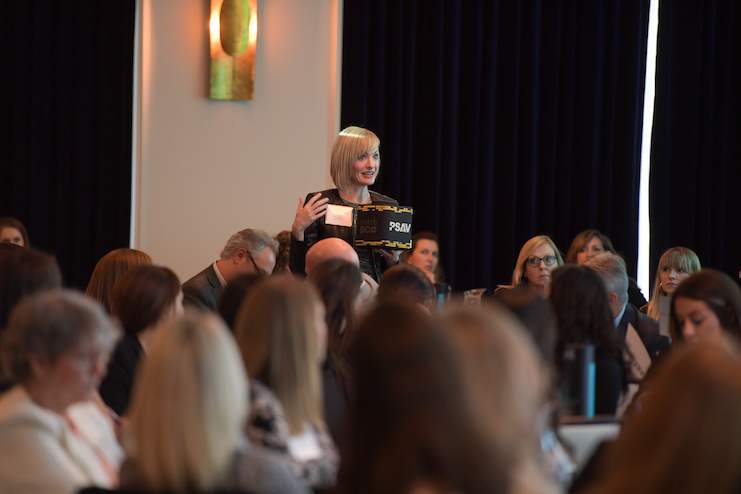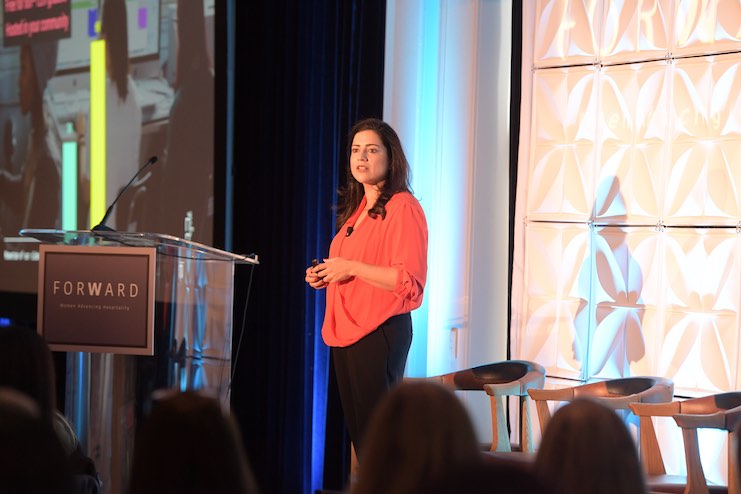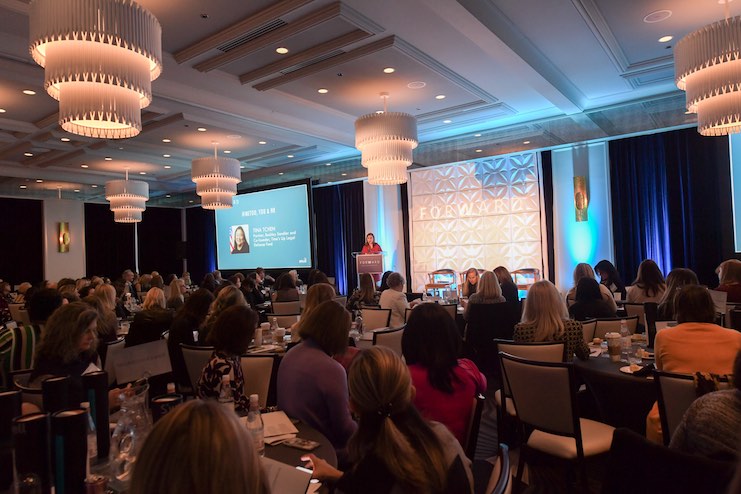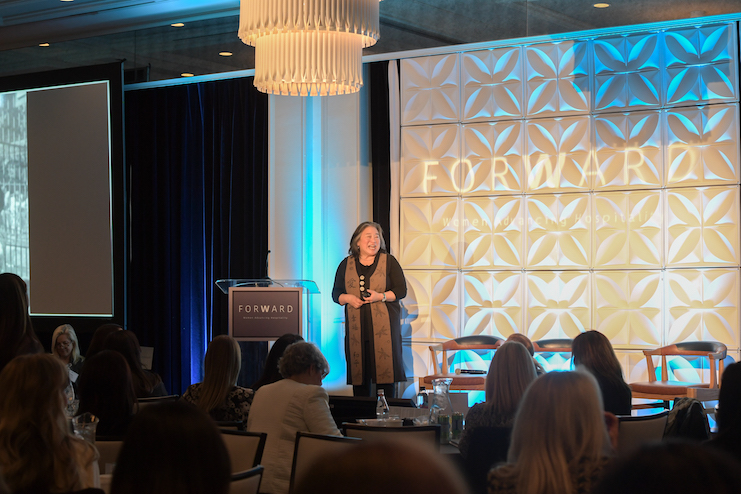Last week, about 200 women and a handful of men gathered at The Kimpton Gray in Chicago for the American Hotel & Lodging Association’s (AHLA) inaugural ForWard conference. The theme—“Women Advancing Hospitality”—drew from perspectives of both seasoned hospitality professionals and high-achieving leaders from outside the industry, including keynote speaker Karen Hughes, worldwide vice chair of Burson Cohn & Wolfe. During the two-day event, each of these women shared her own personal experience and advice for rising up in her respective field and making a greater impact on the world.

“You all are an incredibly accomplished and impressive group of people who are here to support each other and help drive the continued growth and development of the hospitality industry,” said Kevin Carey, executive vice president and chief operating officer at AHLA, addressing the group on Nov. 14. “As an industry we’ve enjoyed years of business growth. We’ve also seen growth for women in our industry, and it has largely been the result of all of us working together. Yes, there’s been progress. But it can and needs to move faster.”
When women succeed, businesses succeed, and hospitality as an industry succeeds—this recurring theme at ForWard came up again and again as evidence supporting the value of embracing and fostering diversity within the hotel business. In particular, Jane Pierotti, president of Counterpoint who MC’d the ForWard conference, pointed to a University of California Davis study of 400 of the largest California-headquartered public companies. The research found that the 25 firms with the highest percentage of women executives and board members had median returns that were 74 percent higher than the entire group surveyed.
One of ForWard’s speakers, Reshma Saujani, is the founder and CEO of Girls Who Code, a national non-profit organization working to close the gender gap in technology and change the image of what a programmer looks like. Saujani emphasized the importance of teaching women to be comfortable with failure and rejection. “We raise our girls to be perfect, and we raise our boys to be brave,” she explained. “From the time that we are really young as girls, we’re taught to smile pretty, play it safe, get all A’s. And we teach our boys to crawl to the top of the monkey bars and just jump headfirst.” In addition to teaching the next generations, she advised the women in the room to practice every day bravery. “In life, if you guide yourself out of passion rather than fear, and you don’t talk yourself out of your deepest convictions, then anything is possible,” Saujani said.

The Next Generation
During ForWard, the American Hotel & Lodging Educational Foundation (AHLEF), the philanthropic arm of AHLA, released a new report on the next generation’s perception of hospitality as an industry and career path. Conducted by BW Research Partnership in collaboration with Hcareers, the study showed that more than 50 percent of Gen Z respondents—defined as individuals between the ages of 15 and 23—expressed interest in working in the hospitality industry. Shelly Weir, senior vice president of career development at AHLEF, and Stephen Jordan, senior innovation consultant at BW Research Partnership, together explored and presented the results to those in attendance at ForWard.
“Finding and retaining talent is the number one challenge right now,” Weir said. “While there’s been a lot of focus on Millennials, our foundation wanted to fund a research study to help look at the next generation that’s coming.”
In terms of the differences between Gen Z female and male respondents, the study found that young women of this generation were twice as likely as their male peers to include the words ‘altruistic’ and ‘ethical’ in a one- or two-word description of their dream job. Other high ranking values for Gen Z women was a company that treats them well and is responsible. Gen Z men were more likely to value a company and job for paying well and having good benefits. “This is known as a generation that is really interested in social justice,” Jordan commented.

#MeToo
In a conversation with Rosanna Maietta, AHLEF president and AHLA senior vice president of communications and public relations, Tina Tchen—partner at Buckley Sandler, co-founder of Time’s Up Legal Defense Fund, and another speaker at ForWard—shared her view of why #MeToo and the national conversation around sexual harassment has taken off in recent years.
“I’ve been living these issues and working on these issues for many decades now, and I will say, I’ve never seen momentum like this. I’ve never seen the open door into the C-suite on these issues,” Tchen shared. In the past, the country has experienced moments where sexual harassment became part of the national conversation. However, Tchen explained, when celebrities began to tell their stories, that resonated with U.S. women. “We know these people in a way that we didn’t know Anita Hill or other people who have come forward in the past,” Tchen said.
Social media also made a difference in keeping the national conversation around sexual harassment alive, Tchen added. “27 years ago when Anita Hill came forward, if this had happened to you, what would you do? You would tell 10 of your friends, and it would stop there. There was no vehicle to go anywhere else. With #MeToo and the existence of social media, all of the sudden, average women who had this happen to them could find [their] voice. All of the sudden, their story was heard by millions, and they felt supported, which led to other women coming forward.”

Defining Success
Another major topic of discussion at ForWard centered around defining success. Kathy Burns, managing partner at Sea Pine Partners, shared character traits that successful women leaders share. A deep passion for what they do, a strong belief in their own success, and no fear of taking risks are just a few of these characteristics.
Another speaker at ForWard, Desiree Rogers, chair of Choose Chicago, also shared her views on success and financial wellbeing. “I think it’s imperative that women think about the creation of their own wealth early on,” Rogers shared. “One day you want to look at your family and say, ‘Now we’re here.’ Often times, women passionate about their work find themselves conflicted about their honest desire to make money. Listen: You’re not a bad person because you want to create wealth for yourself and your family.”
“Show up believing in your work,” Rogers advised. “I dream of the day when more of us take care of our own financial health, like we so often nurture, grow, and tend to the financial health of the companies we work for.”











